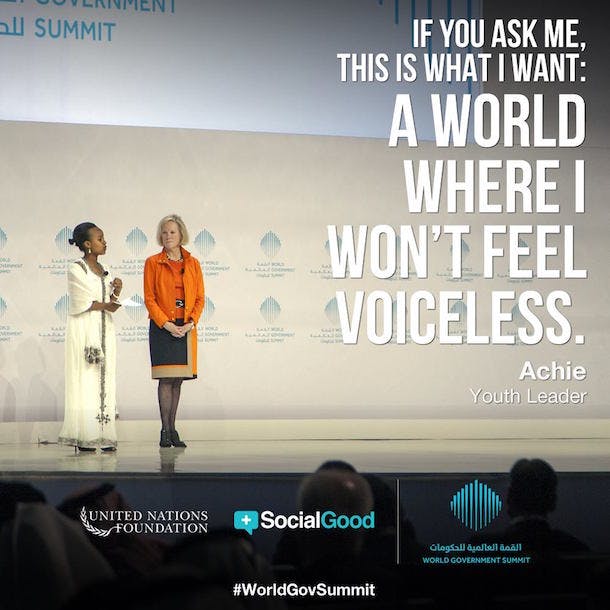
Editor’s Note: The text below was delivered as a speech on February 10, 2016 at a summit in Dubai on how innovation can help governments better deliver for their citizens.
No discussion about shaping future governments would be complete without talking about two things: the Sustainable Development Goals and young people.
In 2015, 193 governments embraced the vision of world without poverty and with opportunity for all when they adopted the Sustainable Development Goals. And they did this in concert with citizens, in a global conversation that was the largest of its kind – built with high ambitions and even higher expectations.
In 2016, our collective mission is to start moving from aspiration to action to achievement.
This will happen only if we address the needs of young people. So I want to focus on the power of youth to achieve our global development agenda, and what governments can do to make sure we give them that opportunity.
Today, we have the largest youth generation in history – about half of the global population is under age 30. And the majority of young people live in poorer countries.
While the exciting technology and innovation we’ve been discussing here are advancing global progress, it still hasn’t reached many of the young people living in poverty.
Without adequate education and access to opportunities, they are competing in a world where the rules of power are changing and inequality is growing. They face shrinking job markets. And they must grapple with challenges that defy borders, but impact their homes – from climate change to disease outbreaks.
The global goals are about making sure no one is left behind. So we must prioritize enabling the world’s most vulnerable youth to move from poverty to prosperity and unleashing their potential.
The good news is: This generation can be the architects of a better future, if we make sure they have the chance. By nature, young people are innovative, determined, and eager to make a difference. As Muhammad Yunus says, they don’t need to be job seekers; they can be job creators.
When they are empowered, today’s youth are launching start-ups…producing apps to use energy more efficiently…finding ways for farmers to grow more food…and creating nonprofits focused on clean water and poverty eradication.
Therefore, our opportunity and obligation today is to make sure all young people are empowered and also engaged as true partners in the decisions we make to achieve the sustainable development agenda.
So how do we do this?
First, we need to collect more and better data to give us an accurate picture of their lives.
We especially need to improve our collection and use of gender data because we have big gaps that obscure the challenges facing girls and women today. Fundamentally, data is about more than counting people, it’s about making sure people count.
Second, we need to build and restore trust in governments. We need to reinvent, as this summit has been discussing.
Right now we have a global confidence crisis. Young people particularly have little faith in institutions, especially government, to do the right thing.
Fortunately, it is also the case that today’s young people are motivated to engage with organizations that are driven by purpose.
This provides an opening for governments and organizations to build trust by showing that their work is about more than bureaucracy; it’s about serving all of their citizens.
And trust is also served by transparency. And transparency is served by communicating with young people – in their language, on their concerns, and in their media.
Next, governments should open their doors wider and bring more young people inside.
The UAE’s announcement to bring in a 22-year-old female youth minister is exactly the kind of leadership we need. Congratulations on demonstrating disruption!
As we discuss empowering youth, I want to emphasize including girls, who have too often been left out of global progress.
Simply put: Empowering young people, especially girls, is the right thing to do and the smart thing to do.
Now we opened the segment by asking young people what they want from government. And we will close the same way.
I’m inviting a special guest to join me onstage to give a few final words about what young people want for the future. Her name is Achie. She is an amazing youth leader from Ethiopia, and she will give you hope.
When we reach the end of the Sustainable Development Goals in 2030, Achie will only be 33, which means her leadership will continue for decades.
Achie, will you share with us what your generation wants for the future?
Thank you, Achie, and thank you, your Excellencies, for letting the future join the stage today.



 View All Blog Posts
View All Blog Posts